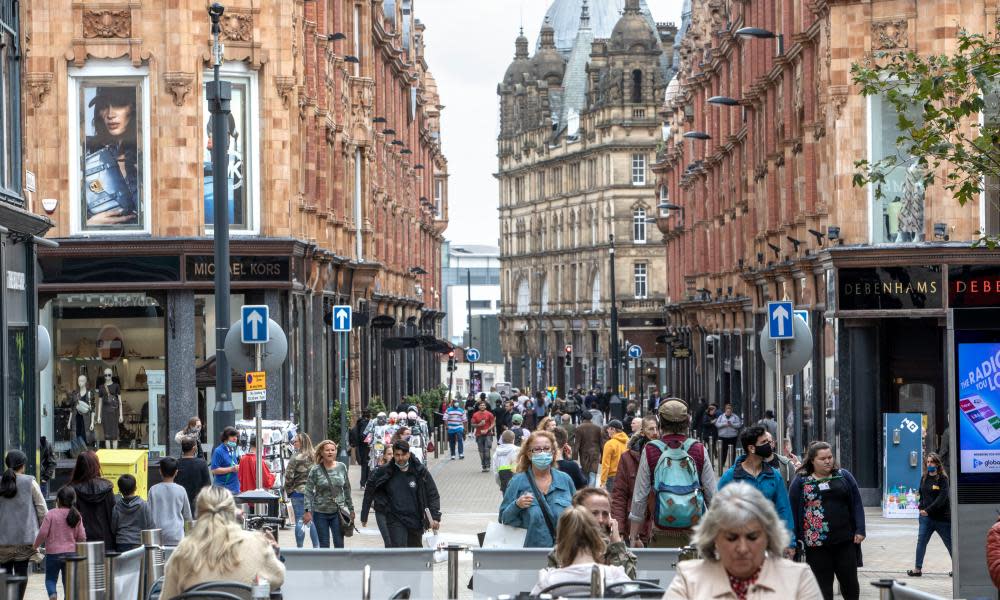Virus hotspots could lead to third Covid wave in UK, scientists warn

Leading scientists have warned that the government is risking a third wave of Covid-19 by easing the lockdown at a time when official data still shows virus hotspots across many parts of the country.
With the UK poised to lift many Covid restrictions on Monday, the scientists accuse ministers of abandoning their promises to “follow the data, not dates” in a rush to reopen society and the economy.
A more cautious, sensible approach would be to wait until more among the tens of millions of people who have yet to be inoculated have had their vaccinations, they say. In addition, they point out that without an adequate system for isolating people who become infected, there could be significant rises in daily Covid cases that could erupt over the next few weeks.
Watch: How England will leave lockdown
Stephen Griffin, of Leeds University medical school, told the Observer: “There are areas in West Yorkshire, the Black Country and other regions that still have high infection rates. However, many people there cannot afford to self-isolate. We need to tackle that issue urgently or the virus will come back again.”
The government has said it would not lift restrictions until infection levels are low enough but Griffin said that its promise to follow “data not dates” now appeared to have been abandoned.
“It’s worrying,” he added. “They are saying one thing and doing another – again. There are far too many virus hotspots and not enough attention being paid to controlling infections that might spread from them.”
While the average number of cases per 100,000 people is 30.7 across the whole UK, 28 local authority areas have at least double that number, with five – Wakefield, Barnsley, Mansfield, Corby and Clackmannanshire – recording at least three times as many.

Professor Lawrence Young of Warwick medical school added: “The test, trace and isolate system that is supposed to contain outbreaks has not worked well, and even when people test positive, they are not isolating. We need a properly funded system for quarantining infected people. We don’t have that and that raises the risk we could head back into trouble again quite quickly.”
While there is still criticism in scientific circles, overall approval for the government’s handling of the pandemic is now positive for the first time since May 2020, in the latest sign that the vaccine rollout has helped transform its fortunes.
The latest Opinium poll for the Observer found that 44% now approve of the government’s Covid handling, with 36% disapproving. Driving the approval is support for the vaccine distribution programme, with 72% approving of the efforts and only 8% disapproving. Support is high even among Labour (71%) and SNP voters (57%). A majority of voters (54%) believe the government’s roadmap out of Covid restrictions is at about the right pace, up slightly from 47% a fortnight ago.
Scientists also worry that vaccine acceptance by younger people could be affected by reports of rare cases of blood clots being linked to the AstraZeneca jab. “That is also a concern,” said Young. “The government needs to generate a really strong communication campaign around the vaccine to reassure people that everything is safe.”
The poll shows clear majority support among the public for taking the vaccine but concerns among young people over possible side-effects. Among those who haven’t been offered a vaccine, 59% of 18-34-year-olds said they definitely would take one if offered and 17% probably would. Among the same age group, 44% said they were concerned about adverse effects, up from 42%.

From tomorrow, food and drink can be served outside again while non-essential retailers will reopen, along with gyms, hairdressers, spas, libraries and community centres. Overnight stays away from home in England will be permitted and self-contained accommodation can reopen, though only for members of the same household or support bubble. Zoos, theme parks, drive-in cinemas and drive-in performances events can also reopen.
Further easing of restrictions – including allowing two households to meet indoors – are likely on 17 May. Some scientists fear that case numbers will need to be far lower before the next set of restrictions are lifted.
The government announced on Saturday that a further 40 people had died within 28 days of testing positive for Covid-19, bringing the UK total to 127,080.
Meanwhile, the government faced renewed criticism over its Covid travel policy. A travel trade body on Saturday called for an investigation into the costs of coronavirus tests for people in the UK wanting to go abroad on holiday this year.
A “framework” for the resumption of overseas leisure travel has been announced by the transport secretary, Grant Shapps, which includes requiring all passengers to take pre-departure and post-arrival coronavirus tests. Post-arrival tests must be the PCR type, which cost about £120.
The requirement has led to a furious backlash from the travel industry, which wants travellers from low-risk countries to take lateral flow tests, which are cheaper and quicker.
Watch: Do coronavirus vaccines affect fertility?

 Yahoo Movies
Yahoo Movies 
